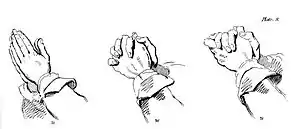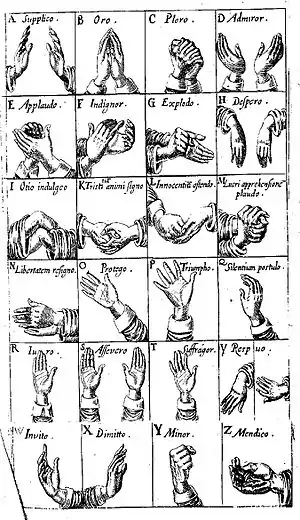Chironomia
Chironomia is the art of using gesticulations or hand gestures to good effect in traditional rhetoric or oratory. Effective use of the hands, with or without the use of the voice, is a practice of great antiquity, which was developed and systematized by the Greeks and the Romans. Various gestures had conventionalized meanings which were commonly understood, either within certain class or professional groups, or broadly among dramatic and oratorical audiences.

Hand gestures images. Austin, Gilbert. Chironomia, or a Treatise on Rhetorical Delivery. London: 1806. Ed. Mary Margaret Robb and Lester Thonssen. Carbondale, IL: Southern Illinois UP, 1966. Clasped, crossed, and folded hand positions. (Chironomia Plate 8, Figures 75, 76, 78)

Chirologia, 1644

Representations of Jesus often employ various rhetorical gestures, as seen on this statue in a shop window in Little Portugal, Toronto.
Gilbert Austin was a well-known author on chironomia. The article about him contains a summary of theories in chironomia.
See also
References
- John Bulwer, Chirologia ; Or the Natural Language of the Hand. Chironomia or the Art of Manual Rhetoric (1644). (Landmarks in rhetoric and public address).
- Gilbert Austin, Chironomia, or a Treatise on Rhetorical Delivery (1806). Ed. Mary Margaret Robb and Lester Thonssen. Carbondale, IL: Southern Illinois UP, 1966.
This article is issued from Wikipedia. The text is licensed under Creative Commons - Attribution - Sharealike. Additional terms may apply for the media files.